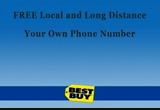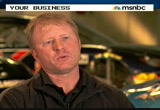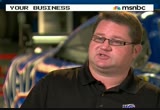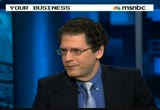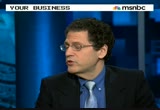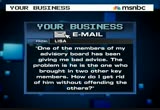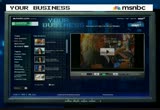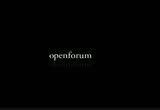tv Your Business MSNBC January 3, 2010 7:30am-8:00am EST
7:30 am
7:32 am
7:33 am
to present "your business" on msnbc. hi, everybody. welcome to "your business" where we give you tips and advice to help your business grow. in today's economy where unemployment numbers are still climbing, we found an inspiring story of a man who lost his job in december and then managed to start his own business in the same industry just a few weeks later. his name is tommy baldwin. if you're a nascar fan, you just might want to buckle up. ♪ >> let's go, boys. >> reporter: tommy baldwin is one of america's top nascar race team leaders. for the past ten years he worked
7:34 am
as crew chief for championship teams. most recently he led bill davis racing which won the daytona 50 500. >> i was the guy that was running up front part of great teams, had great people, great race car drivers, great sponsors, running up front week in and week out. we didn't help anybody. >> reporter: top nascar teams have always had plenty of money to hire talent like his. that is until the economy stumbled. the sponsors fled, and baldwin's boss was forced to sell the team. >> there was a handful of us that were hoping that the people that bought the race team wasn't going to liquidate it. was going to try to keep if going. they had some sponsors. we were hoping and praying that wasn't the case. i would still be there today if it was. >> was something that was hard on everybody, i think. not to mention unexpected. but, you know, it was a tough thing to handle. >> reporter: like salaried
7:35 am
workers in so many industries, tommy baldwin lost his job this past december. both he and his wife beth were completely caught by surprise. >> we were told that day and we left that afternoon, that was it. it was over no severance, nothing. >> we just immediately had to start thinking about, you know, where he was going, where our future was going. >> i just said i'm going to just put together my own race team. that's it i worked through for about a week. talked to some people. met with some people. got some things going. ♪ >> reporter: just a few weeks after losing his job, baldwin managed to assemble his own racing team. >> the only way we can do it is take it apart, right? get with him. see if we can take it apart. >> reporter: as the owner he named his new business tommy baldwin racing. how did he do it? how did he go from out of work race crew chief to nascar race team owner? >> we have to do the best we can do and let everything else take care of itself. >> over the holidays i got to
7:36 am
thinking, putting some numbers together. i knew the equipment that was available. the cars that were available. the people that were going to be available because all the teams closing down. >> reporter: while the down economy opened up low-cost opportunities to buy equipment and hire staff, he also needed cash. >> it's very expensive. you know, just -- it's -- there's a lot of fixed costs that are already involved. you know, if you wreck the car, it's more cost. >> reporter: all of these teams need tens of millions of dollars to maintain the cars, hire the staff and travel around the country. and that's why all of these cars are plastered with advertising and logos. >> when tommy is out there racing, when we get tv time, we can actually watch our e-mails skyrocket. >> reporter: that is david tomacello. >> i think when the car drives on the track we lose that. >> reporter: he's the owner of wave energy drink.
7:37 am
right you to his company is the primary sponsor for tommy baldwin racing. >> it's helped us increase the awareness of our franchises. >> reporter: while everyone knows this is the sound of nascar -- >> nice meet you. >> reporter: many don't realize this is also the sound of nascar. >> you can't just say you will put somebody's name on the car and you will be successful. it's no way like that no longer. >> branding is how you can tell. it's all the advertising. how we promote the car. it's the driver appearances. so there's more to it than just the car driving around the track. >> reporter: for baldwin, beyond fielding a highly competitive team, the biz as soon as about building long-term relationships with his sponsors. >> it takes a good two, three years for any type of business to be successful. just trying to build those platforms with all those people. >> reporter: in charlotte, the team caught a bad break. >> if we beat that, we would be in already. >> reporter: it was so close but
7:38 am
they were too slow to qualify for that race. it was a heart breaker. but it was by no means a deal breaker. >> being a young team, we're not necessarily making every race, but we're still getting the exposure. >> that's where you lose the 0.02. >> missing a race hurts, but i see light at the end of the tunnel. >> there's a lot of good things getting read i do happen for tommy baldwin racing in the future. we have to stay alive long enough do it. ♪ tommy baldwin clearly revved things up when he went from employee to employer, but how easy is that type of transition? let's go to this week's board of directors. jennifer hill is vice president of astia, which is a group dedicated to working with female entrepreneurs, and bill gelden is an instructor at the wharton school. do you think this is a viable option for most people? absolutely in this economy,
7:39 am
there's a lot of accidental entrepreneurs. he's got a real chance for success. he has all the contacts, all of the industry knowledge. sounds like he's doing a good job of putting it together. >> a lot of people who might be inclined or have an idea but just can't do it because they have their 401(k), their health care, suddenly they're out of a job. do you see that a lot. >> you do but also for the successful companies, about 70% of them are involved in something they had been involved in before. he had the network, the knowledge of the industry, the cars, the relationships that gives him an advanced chance over somebody starting from scratch. >> what amazed me from b. this piece is a few weeks later. he didn't take time to cry or mourn his job. >> that's a great trait of an entrepreneur. instead of sitting back looking at what went wrong, he's moving forward as fast as he can to do things right. >> what do you say if someone says i lost my job, i know this industry so well, i want to
7:40 am
start my own company. what do you say? >> that's fine. you have to start with analysis. you have to analyze finltly can you get through, all those other work issues. in the end, if you have the network and knowledge and you have the passion, which he clearly does, that goes a long way. so you have to always balance activity with analysis. >> and what about resources? where do you send them. >> look for people who worked with you. some of your best people who can be i vesters or advisers are people who you worked with before. he should be able to find the right people to make his business successful. >> another thing he brought up is when it comes to sponsors, you just can't say be my sponsor, put your sticker on. there you have to work, develop those relationships and give them a bit more than what they expected years ago especially now. ad dollars are so few and far between you have to have something different. since he reinvented himself as an praent nur, he has a fantastic opportunity do that
7:41 am
and show new and innovative value for the sponsors. >> now you can look at e-mails going up, you measure. that's the difference. you can show wave or whatever that advertiser is, what kind of return are they getting on that. use technology. >> the beauty of all the technology now. >> precisely. >> great. >> it's time to answer some of your business questions. the first is from the owner of a company that sells dvds for babies. >> how much time do you give a marketi marketing strategy before you know if it works or not or if you should change strategies. >> people err on both sides. i didn't get enough customers right away, i got to get rid of this or they keep it going for too long. how do you gauge. >> look at what the sales cycle is for your business. if it's two weeks, like a candy bar, you can get the results quickly. if you're doing a marketing change and it's a three-month or
7:42 am
six-month sales cycle, give it time to work and work that into your planning of the financial plan and marketing plan. >> i think you also need to understand what your marketing is going to do. if you do a big television campaign t may not result in sales but will increase awareness of your brand. so, it seems to me like you have to decide before do you your marketing what is my goal. >> that's it. what is your goal and how long are you willing to spend in terms of time and money to get there. because you're not seeing results right away does not mean you're doing a bad job. a lot of it is what you are measuring. if you know what your goal is, you figured out a way to measure and get there, you can figure out if this is the right thing. >> that's where the internet comes in handy because it's so easy to measure. >> it is. also talk to customers, surveys, websites, everywhere you can to find out how effective your marketing program. >> let's move on to the next one. this is from lisa. she wrote in saying -- one of the members of my advisory board has been giving me bad advice.
7:43 am
the problem is he's the one who brought in two other key members. how do you get rid of him without offending the others this is a great question. part of being a ceo is making difficult decisions there are not more difficult decisions than ones that deal with people. i would make a list of the bad advice what went wrong and why you can come up with objective clear reasons to get rid of this person. then figure out who will you have replace him or her. if you can con vints the othvin two advisory board members, they will be more confident in your decision. this is a question from the owner of a design firm. >> where to look for a cpa and what is the criteria i should be using. >> for a conventional-type of business, look at regional firms, smaller firms with experience in the type of business you are in always get their customers to talk with you, get referrals. if you are a high-growth company
7:44 am
and want to build the company and sell it, talk to the local venture capital partners in your areas, bankers attorneys and so forth. keep in mind, each state has a licensing requirement, skou go on to the state's website and make sure the cpa you are checking out hasn't had much legal action against them. >> it's kind of scary. even if you get a referral, you're entrusting this person with a lot of important stuff to your company. it's scary to make that leap. >> it is you want to find someone that has business forward thinking. a cpa can be an incredibly valuable adviser. look at someone who can look at the macro level and help you make smart business decisions this is important for businesses that are llcs or sole proprietorships where the line between business and personal finances can be blurry. >> how do you figure that out then? a long interview process. >> get referrals. a lot of the big firms are sources. the aicpa has recommendations on
7:45 am
their website. find someone with industry expertise. ask trade associations. ask people. you want to make sure it's someone who is a good fit. you want to be comfortable calling them and asking the hard questions. >> let's move on to the next one. here is a question from alexandria about financing for a tour company. she wrote we started out without any capital. we are trying to do mailings, but we need to add more vehicles and drivers to make this business more successful. however we can't get over that next threshold of funds to do it. we would love to have an investor look at our business. how can we do this? a perfect question for you, this is what you. >> do i hope this entrepreneur is hitting her head on the ceiling of revenue, if it were not for the additional capital she would be able to make her revenues spike. if that's the case, she can show she has lots of demand, customers banging down her door and from day one she can deploy capital, she's in good shape. she should also make sure she's
7:46 am
using cash wisely so they can show potential investors that every dollar in will generate revenue or profit. >> she has a business, showing cash flow, would you suggest she get investors or go to a bank? >> look in every direction. talk and make relationships. business is about people. she should go in with a strong numbers people who knows the difference between making a lot of revenue and making a lot of profit, so it's not just that she will grow the business and break even. if you can make the case that that additional business will make it more profitable, that's the sweet spot. >> one more e-mail from a viewer. it's from andrew. he asks how important is it to get structured feedback from my customers through a feedback card? and how much should i listen to what they say? interesting. you don't want to get one answer and then change your whole business because of it. how do you do it? >> that's right. you do it directly by talking with customers do it in survey instruments that you might hand out at your point of sale.
7:47 am
on the internet. so you have to talk to those customers, find out what that response is and weigh whether that advice is good or bad advice. one way do that is do it incrementally. do it a small change, give yourself time to see if that change is success brfl jumping in and making that change. it's always good to analyze information from your customers, maybe you will find that strength or weakness you did not think of. >> do you think you can do it in a structured way or just chat with people. >> both ways, but do want to solve a particular problem? if you know what kind of information you are seeking to obtain, it's much easier to engage customers then figure out how do it, whether it's more informal, you are calling people up or doing a structured campaign. >> that's an important point, you want to know what you would want to get out of it. >> we would love to get feedbacks out of our customers, that would be from you. we want to hear from but what
7:48 am
parts of our show you find helpful. so please go to our website at yourbusiness.msnbc.com and take our survey. if you have a question for our panel, you can submit it from our webpage. let's get more feedback with a few survival tactics from small business owners just like you. >> my advice would be take the extra time to find the right people to get your product or service established because you spend so much time and energy having to start over when you cannot use or don't find somebody who has the quality and professionalism that you are anticipating. so spend extra time really getting good, quality people. >> my advice for other small businesses during this really hard time would be to not cut back on advertising and marketing. now is the opportunity to stand out where most companies are cutting back. and it's a real opportunity to
7:49 am
make a name for yourself. >> i have a survival tip i like to stick to, it's showing appreciation to your past clients and your vendors in your industry. if you're working with somebody, send them a thank you note a little gift. keep in contact, let them know you appreciate their business. >> there's more information and advice still ahead on "your business." we have tips on thousand boost employee productivity. >> and she built a restaurant and consumer goods empire. b. smith tells us what ingredients make for a successful small business. reinventing the economy,
7:50 am
small business owners have a lot of questions. can paperless billing get me paid faster? how can i keep my best employees? how can i bring down my insurance costs? and while at american express open we may not have all the answers, we know who does. other owners. that's why we're helping business owners connect. together, we're building a community for them to talk, share and help each other. a place called openforum.com where owners can swap ideas and ask questions. will tweeting get me more customers? how can i make my business green? and one question seems especially popular. how can i get paid faster? how can i get paid faster? i was about to ask you the same thing. and they're inspiring ideas like acceptpay. a new tool from open that lets owners invoice digitally and helps them get paid faster. ask a question. find an answer. join the conversation at openforum.com.
7:51 am
talk about a multi-facetted entrepreneur. when you list the industries b. smith has been a part of, it takes a bit of time. she's a restaurateur, an author of three cookbooks, hosted her own tv show. we recently had the chance to sit down with her at one of her restaurants to get her tips on creating a successful business. ♪ >> many times over the years i had people tell me why are you doing this? do you think you can do this? when i wanted to go into the restaurant business i told my model friends i was going work in a restaurant. they were like, my god, why are you going to work in a
7:52 am
restaurant? i was like i want to learn the business and open my own restaurant they kind of laughed and were want to open just a little diner. a little, you know, small hole in the wall. i wanted a beautiful, contemporary restaurant. eventually i went into the business, but i did have to look for the right space in the right location that was affordable. and then it was all about me transforming that space into a real restaurant. my management style is one on one, person to person. i believe in talking to the chefs in the kitchen, talking to the bus boys, talking to each of the employees who are here, joking, being serious, telling them what they do right, because you have to tell people they're doing a great job for you. i treat everybody with respect and i expect to be treated with respect. i love what i do, i love people, i have fun with my customers.
7:53 am
it doesn't always go well. i mean there's always something that can happen, but i try to work with that situation and work with, you know, whether it's an employee or guest and i believe in great service. ♪ >> people ask me how do you build the buzz about who you are and what you're doing. i consciously began to use b. smith not just for the restaurant but i thought of myself as a brand early on. i don't know that i said the word "brand" but i understood that i was the restaurant, the way i presented myself, the way that i presented the restaurant meant a lot. then i realized that you have to make sure that you have and are doing the most and the best that you can with what you have, but you have to be smart with whatever you do. you position yourself. you just don't wake up one day and become a restaurateur, wake up one day and become a model, don't wake up one day and have
7:54 am
products at bed, bath and beyond. everything takes thought and it takes homework and it takes persistence. i've always been a woman who's trusted her instincts. investing in dan even before he was my husband made me feel good, made me understand this is a great thing. i'm excited about my life, i'm the founder and chief creative officer of b. smith enterprises but what really, really makes me happy is the faukts that i found a soulmate who is my business partner who is the chairman of b. smith enterprises. he's brilliant and i love the fact that even when we're not working, we're working. it's really great to have a partner who's your best friend and the best person you could have that works with you. unless you love numbers, chances are you don't enjoy
7:55 am
keeping track of your financials. so our website of the week can help you. less accounting document is a handy site that provides simple web based accounting services. you can track expenses, manage invoices and synchronize the site with your bank accounts. there's a less accounting iphone app to keep tabs on your finances even when you're out of the office. there is a difference between being the leading company and a company that leads. or so says our next guest. simon is the author of the new book "start with why, how great leaders inspire everyone to take action." he's here to tell us why entrepreneurs may be equipped to lead better than any other group. it's been a long time. >> nice to see you jj. >> explain to me the difference, a leading company, a company that leads. >> leading companies sell more than everybody else. gm is a leading company. they sell more cars than everybody else. but they're not a company that leads. a company that leads is somebody that sets the pace, sets the
7:56 am
direction for the entire industry. there's a huge difference. >> don't you want to be the leading company and the company that leads? >> they don't often go together, amazingly because the leading companies are so driven about their market share and being number one, they forget profits are more important. and you know, in business everybody is really a follower and apple, you hear me talk about them all the time, virgin, harley-davidson, these companies aren't the leading companies. southwest airlines doesn't have more routes than everybody else but they set the tone and direction that everybody else follows. >> and so when you say to be one of these leading companies, one of the things you need to have is a clarity of why. what do you mean by that? >> absolutely. every single company that leads knows why they do what they do and by why, i don't mean to make a profit. that's always a result. what's your purpose, your cause, your belief. why was your company founded. and very often and you look at entrepreneur, the most successful, it was some sort of personal experience that had them start their company in the first place. their parents couldn't get good home care and they started a home care business. couldn't get a good burger
7:57 am
started my own burger company. >> it's important for the founder to understand that or for the company to understand that? >> well, if the founder doesn't understand it then no one in the company will understand it. >> right. >> absolutely it starts with the founder. and there's a huge importance in the ability to communicate what you believe. you know, it's very closely linked, you know, those people who have the ability to communicate what they believe clearly are the ones who lead. it's inexplicable connection between leadership and communication. >> about passion and other people sharing your passion. then you say they get their why and have to have the discipline of how. so that's how you get your product out there or your service out there? >> it's even -- i think it's deeper than that. every company has guiding principles and values. how do you hold yourself accountable to them? you hear companies talk about we believe in customers first but when you look at the way they actually do business, you very often see that they don't put customers first. a lot of promotions, for example, are designed to trick the customer, you know. we -- you fill out all of this
7:58 am
crazy paperwork and we'll send you a rebate and they know most people aren't going to fill it out. how customer focused are you if you're tricking your customer to do business for you. >> the third thing is the what, which is interesting because i often in our conversations have said, well, when you say what is your company do, i would say what my company does. you say i should say why they do it. but then here, what is important as well. >> absolutely. we live in a tangible world. why you do what you do is a belief, it's intangible. the most important thing -- >> that draws them in. >> the things you say and the things you do, you have to believe in. in other words, your products, your packaging, your marketing, your people, they have to embody what you believe, otherwise no one will know what you believe. >> you draw people in and then you deliver. >> this is the concept behind authenticity. everybody says you have to be authentic, but what does that mean. things you say and things you do you believe. >> congratulations on the new book and thank you so much for coming by to tell us about it. >> thank you very much. >> for small companies with a
7:59 am
limited staff, individual productivity is very important. so here are five tips to maximize your employees' output courtesy of the "wall street journa journal"'s website wsj.com. number one, retrain or cross-train employees. businesses running on a lean staff need people that can function in more than one role. two, set standards. measure productivity and create realistic goals for your staff. it's important that people know what's expected of them. three, develop leaders. instead of hiring outsiders, look for ways to encourage leadership from within. that can improve employee engagement. four, cut down on distractions. try to set a balance between work and personal time. encourage employees to tend to personal matters on breaks. and number five, look into software programs that can handle basic administrative and marketing tasks such as contact management and crm. to learn more about today's show, click on our
176 Views
IN COLLECTIONS
MSNBC Television Archive
Television Archive  Television Archive News Search Service
Television Archive News Search Service 
Uploaded by TV Archive on

 Live Music Archive
Live Music Archive Librivox Free Audio
Librivox Free Audio Metropolitan Museum
Metropolitan Museum Cleveland Museum of Art
Cleveland Museum of Art Internet Arcade
Internet Arcade Console Living Room
Console Living Room Books to Borrow
Books to Borrow Open Library
Open Library TV News
TV News Understanding 9/11
Understanding 9/11
